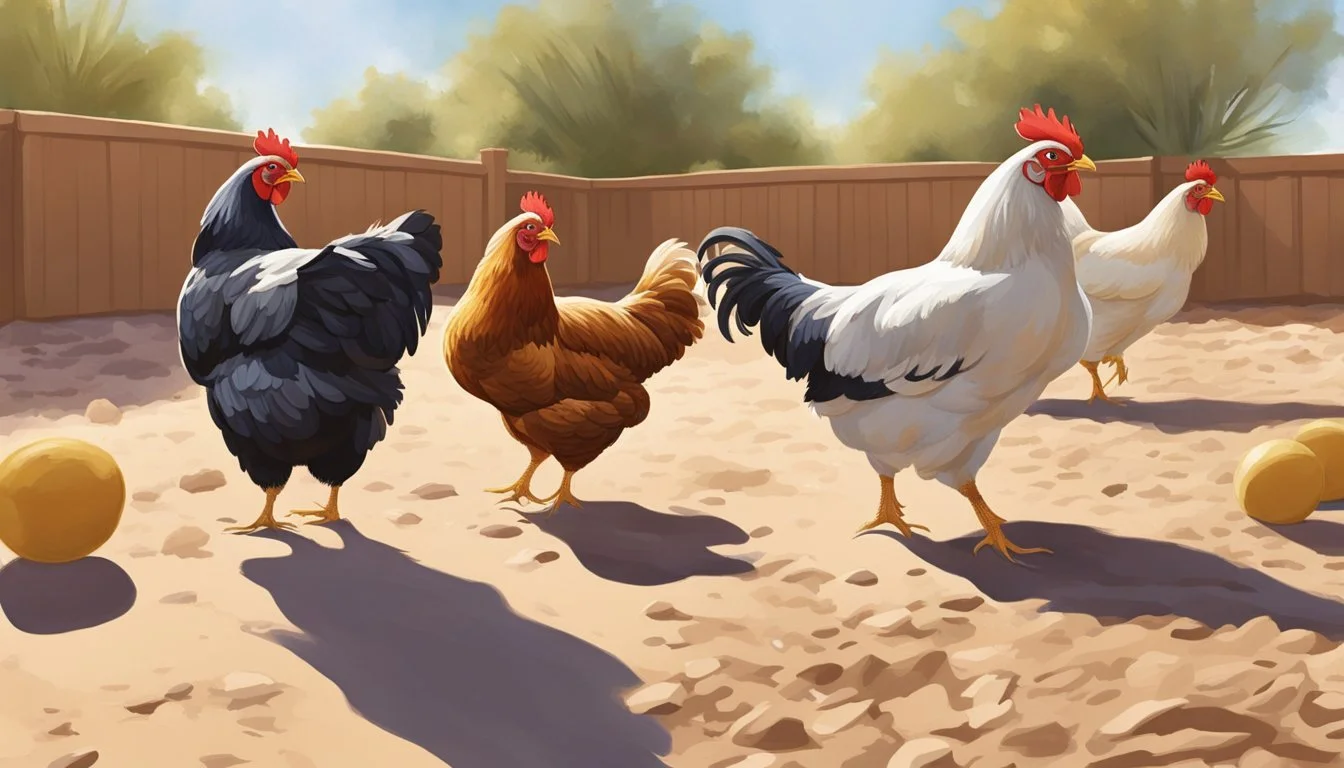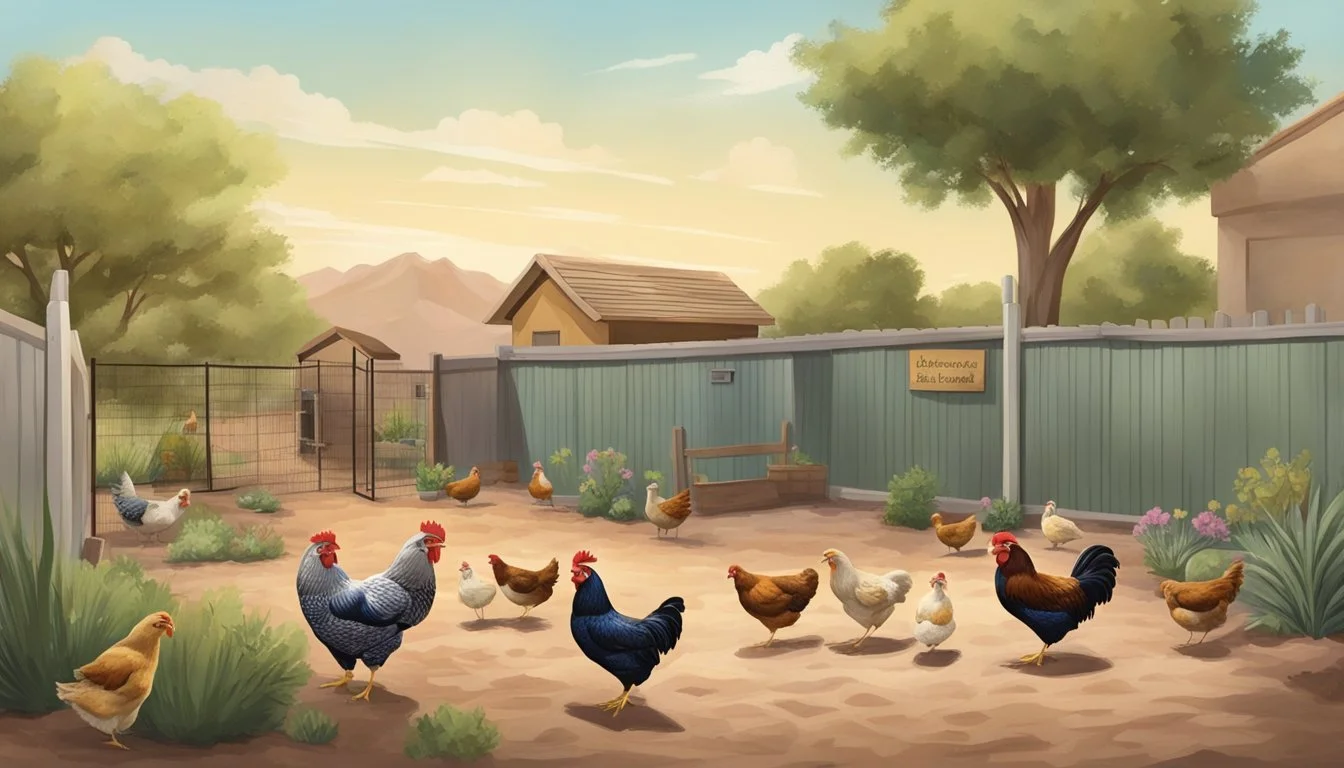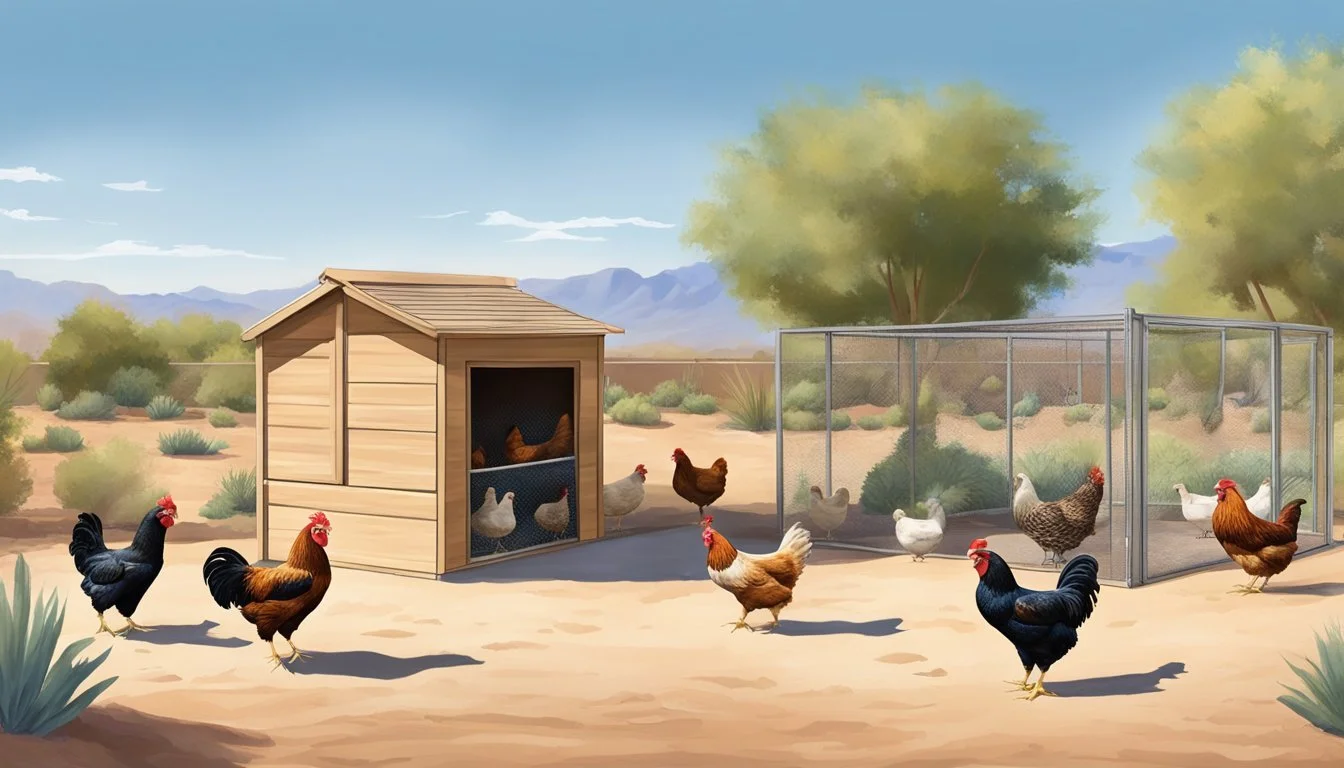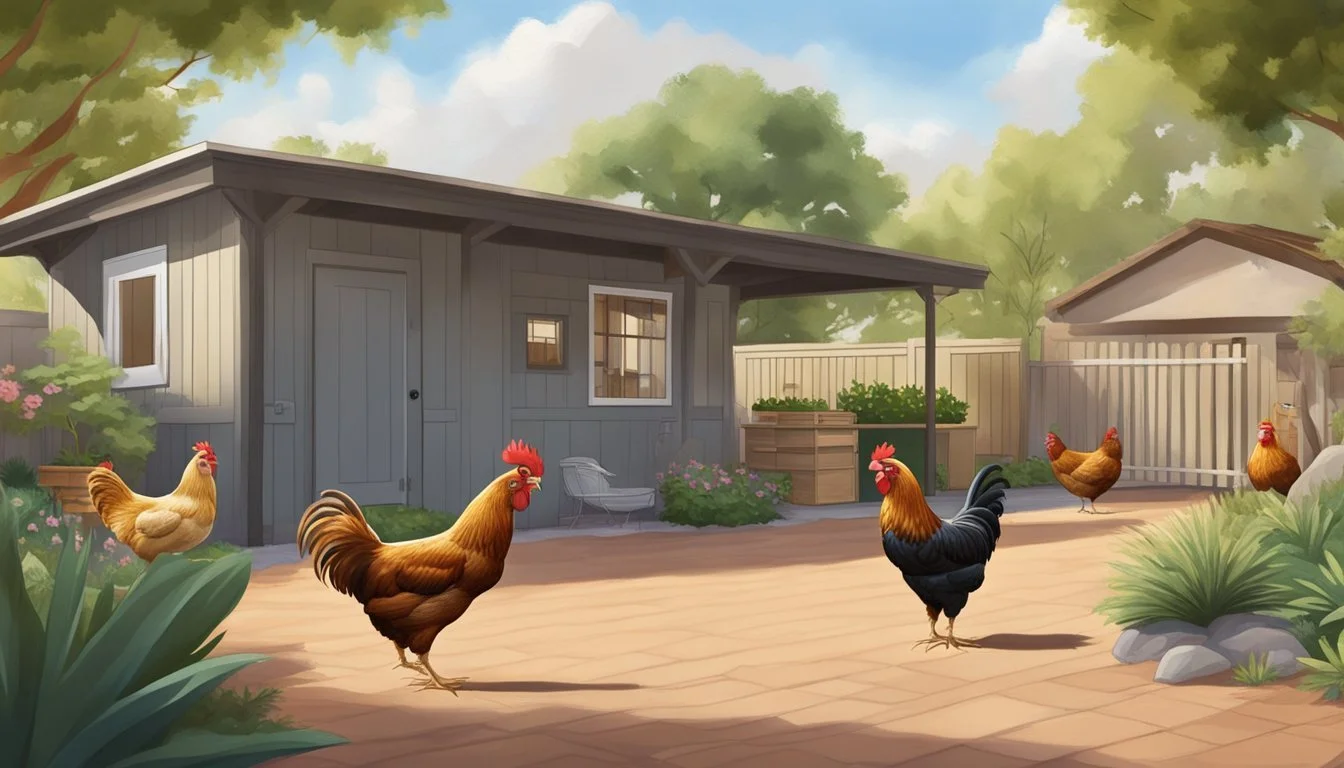Keeping Backyard Chickens in Chandler, AZ
A Practical Guide to Urban Poultry Farming
Residents of Chandler, Arizona, have something to crow about when it comes to urban farming and sustainability practices. The city has established ordinances that allow for the keeping of backyard chickens, bringing the trend of fresh, locally-sourced eggs straight to their doorsteps. With a growing interest in organic produce and self-sufficiency, the citizens of Chandler can now engage in raising up to five chickens per single-family property, provided they adhere to specific regulations designed to maintain public health and safety.
These regulations encompass the careful housing of chickens in secured coops within designated rear and side yards to prevent them from wandering onto neighboring properties or public areas. By prioritizing the containment of these birds, the city aims to ensure that the benefits of backyard chicken keeping are enjoyed without disrupting the community. The rules reflect a thoughtful approach to blending the joys of raising chickens with community living, allowing residents to embrace a slice of rural life in an urban setting.
Understanding Local Ordinances
When residents of Chandler, Arizona consider raising backyard chickens, they must navigate a set of local ordinances that dictate proper practices and limitations. The City Council has established clear rules, which are designed to maintain community standards while allowing individuals to engage in this activity.
Key Ordinance Points:
Limits: Chandler residents are permitted to keep a maximum of five chickens on each single-family property.
Location: Chickens must be confined to the rear and side yards.
Containment: It is required that all chickens remain within their owners’ property lines, prohibiting them from wandering onto streets, alleys, or neighboring properties.
Housing Regulations:
Coops: Chickens are to be housed in secure coops.
Placement: The chicken coop must be placed ensuring it does not encroach upon public spaces or trespass onto adjoining properties.
Planning and Zoning:
Chandler falls within Maricopa County, where zoning regulations may impact the implementation of the chicken ordinance. Therefore, residents should verify their specific zoning regulations to ensure compliance.
Permit Requirement:
While the ordinance details do not explicitly state a permit requirement, individuals planning to build a chicken coop should verify if permits are needed for construction or modification of existing structures.
Additional Considerations:
Neighbor Consent: In cases where coops are within 200 feet of another residence, other than that of the owner, Chandler citizens must obtain written consent from their neighbor.
The Chandler City Council approved these regulations with the intention to balance personal freedom and public interest. Residents must adhere to these ordinances to sustainably and legally raise backyard chickens within city limits.
Setting Up Your Chicken Coop
When planning to raise backyard chickens in Chandler, AZ, residents must carefully consider coop location, design for health and safety, and adhere to local zoning restrictions to ensure a successful and compliant setup.
Selecting the Right Location
The right location for a chicken coop is vital to the birds' well-being and the owner's convenience. Chandler residents should place the coop in an area that provides shade during the hottest parts of the day while also ensuring it has enough sun exposure to keep the coop dry and mitigate the growth of bacteria. It's crucial to avoid low spots that can accumulate water, as these may attract rodents and other pests.
Designing for Safety and Sanitation
A well-designed chicken coop will protect backyard chickens from predators and maintain proper sanitation to prevent the spread of disease. The coop should have:
Sturdy walls and a secure roof
Wire mesh on windows to keep predators out
Easy access for cleaning
Adequate ventilation to prevent respiratory issues
Proper waste management is essential to avoid attracting pests and creating a nuisance.
Understanding Zoning and Property Line Restrictions
Chandler's zoning laws state that chicken coops must be kept within the rear and sideyard of a property, avoiding the front yard. They must be at least 5 feet away from the property line. To prevent nuisance, coops must not be placed in a location that allows chickens to trespass onto neighboring properties, streets, or public spaces. Permits may be required for coop construction, and residents should confirm with city planning if their coop meets the necessary requirements. In some cases, written consent from neighbors is necessary for those seeking to place a coop within 200 feet of any residence other than their own.
Chicken Care and Management
Keeping backyard chickens in Chandler, AZ, requires attention to daily maintenance, health management, and the mitigation of potential nuisances.
Daily Maintenance and Feeding
Daily care of chickens involves providing fresh water and proper feed. Chickens require constant access to water, so it's essential to check and refill their water containers at least once a day. When it comes to feeding, hens benefit from a balanced diet consisting of layer pellets, grains, and occasional treats, such as fruits and vegetables. The enclosure should be kept clean to prevent odors and disease, with a routine of removing waste and turning over bedding materials.
Sanitation: Regular cleaning to remove droppings and old feed.
Feeding Schedule: Consistent times for refilling feeders with appropriate food types.
Health Concerns and Disease Prevention
Chandler residents must monitor their backyard chickens for signs of illness, including changes in behavior or appearance. Maintaining good sanitation practices, such as cleaning coops and properly disposing of waste, helps prevent the spread of disease. Regular veterinary check-ups, vaccinations, and parasite control are essential for the health of the flock.
Disease Monitoring: Regular observation for symptoms of illness.
Veterinary Care: Vaccinations and treatment plans for common poultry diseases.
Managing Noise and Nuisance Issues
To address concerns about noise, odor, and other nuisances, owners should ensure their hens do not disturb neighbors. While roosters are often associated with noise, keeping only hens minimizes this issue. Proper enclosure construction and regular cleaning help control smell and reduce feathers and other debris from becoming a nuisance.
Noise Reduction: Position coops away from neighboring houses when possible.
Odor Control: Frequent coop cleaning to minimize smells.
Community Relations and Compliance
When keeping backyard chickens in Chandler, AZ, residents must consider neighbor relations, navigate homeowner association rules, and comply with city laws. Attentiveness to these aspects helps in maintaining harmonious community interactions and adherence to legal frameworks.
Neighbor Considerations and Complaints
Neighbors play a pivotal role in the successful keeping of backyard chickens. Residents should inform their neighbors about their intent to keep chickens while ensuring their activities do not cause disturbances. Complaints may arise due to noise, odor, or rodents, leading to interventions by city officials. It is beneficial for residents to engage in open communication with their neighbors to mitigate potential issues.
Common Neighbor Concerns:
Noise from hens, particularly during early mornings
Potential odors from chicken coops if not properly maintained
Attraction of rodents or other pests due to feed or waste
Property boundary disputes regarding coop placement
To address complaints, Chandler has designated channels through which neighbors can express their concerns, commonly managed by the City Clerk's office or a relevant city department.
Navigating Homeowner Associations (HOAs)
Homeowner Associations may have specific bylaws that regulate keeping chickens in a neighborhood. Before setting up a backyard coop, residents should review their HOA's rules. Compliance with these rules is crucial as they have legal standing and violators may face penalties or be required to remove their chickens.
Steps to Comply with HOA Regulations:
Obtain a copy of the HOA's governing documents.
Check for any covenants, conditions, and restrictions (CC&Rs) relevant to poultry.
Discuss intentions with the HOA board if guidelines are unclear.
Adhere to any HOA-specific requirements alongside city regulations.
Legal Requirements and Enforcement
The City Council has passed ordinances that allow the keeping of backyard chickens under certain conditions. Residents must follow these legal requirements to avoid penalties. The number of hens, coop specifications, and property size are typically regulated. The city's Planning Division can provide the full details of the laws governing backyard chickens in Chandler.
Key Legal Stipulations:
Allowed number of hens (often up to five, with no roosters permitted).
Setbacks from property lines and dwelling structures.
Maintenance standards for coops and outdoor areas.
Enforcement of these regulations is the city's responsibility, and non-compliance may result in citations or fines. Residents should contact the city's Planning Division or consult the City Clerk if they need clarification on the ordinances.
Advocacy and Legal Changes
In Chandler, Arizona, local advocacy has significantly influenced legal changes regarding the keeping of backyard chickens. This transformation is marked by active citizen participation and deliberate legislative actions by the City Council.
Current Movements and Debates
City Council Deliberations: Chandler's City Council has reflected the changing attitudes toward urban agriculture through discussions and policy revisions. There has been robust debate among council members, highlighting differing perspectives on the balance between urban living conveniences and the benefits of local, sustainable food sources. The council’s decision-making process included input from the Planning and Zoning Commission, leading to key changes in the City Code.
Public Advocacy: Chandler residents have exercised their civic rights by engaging in petitions to reflect their stance on the chicken ordinance. They have organized to gather the necessary signatures to bring the issue to the city’s agenda. These activities culminated in a drive for a code amendment, aimed at allowing chickens in single-family residential lots.
Participating in Local Governance
City Council Votes: The Chandler City Council plays a pivotal role in legal alterations, where each vote can determine the outcome of any proposed ordinance. Mayor Kevin Hartke and the council members voted on the new ordinance, with a majority supporting the allowance of up to five hens in single-family homes.
Public Involvement: Residents can participate in local governance by attending City Council meetings or presenting their views to the council. Insights derived from community data, such as opinions gathered from the library or reports from the police, can shape the decisions made by the elected officials. The involvement of the Chandler City Clerk is crucial for the procedural aspects of introducing a petition or placing new ordinances on the ballot.
In conclusion, the legal landscape for keeping backyard chickens in Chandler has evolved through community advocacy and the responsive actions of the City Council.
Health and Safety Considerations
Keeping backyard chickens in Chandler, AZ requires conscientious health and safety measures to ensure the wellbeing of the chickens and surrounding community. One must balance protection from predators and wild animals with rigorous practices to prevent the spread of viruses such as bird flu.
Protecting Against Predators and Wild Animals
Backyard chickens are vulnerable to various predators including coyotes, hawks, and neighborhood dogs. Secure housing is essential:
Enclosures: They should be constructed with sturdy materials, such as hardware cloth instead of chicken wire, to prevent breaches.
Locking Mechanisms: Coops should have secure locking mechanisms to thwart clever predators.
Sanitation: Keeping the area clean reduces the attraction of wild animals and rodents, thus preventing an additional nuisance and danger.
Preventing Viruses and Bird Flu
The threat of disease such as bird flu requires owners to implement strong biosecurity measures:
Vaccinations: Stay up-to-date on recommended vaccinations to help prevent the spread of viruses and diseases.
Coop Cleaning: Regularly clean coops and replace bedding to maintain sanitation and reduce the risk of disease.
Isolation: New chickens or those showing signs of illness should be isolated to prevent contamination to the flock.
Surveillance: Monitor for signs of illness and report any instances of bird flu to local authorities promptly.
Adherence to these health and safety considerations ensures responsible chicken ownership and community protection.
Supplementary Activities and Benefits
Keeping backyard chickens in Chandler, AZ, offers a variety of supplementary activities and benefits that enhance gardening practices and provide educational opportunities for families.
Gardening with Chicken Manure
Chicken manure is a potent fertilizer that can significantly benefit gardens in Chandler. It's rich in nitrogen, phosphorus, and potassium, essential for plant growth. To use, allow the manure to compost for at least six months to ensure it is safe and beneficial for garden beds.
Steps for composting chicken manure:
Collect fresh manure from your backyard chickens.
Combine with brown organic material, such as leaves or straw.
Allow the mixture to compost, turning it periodically.
After six months, the compost can be added to your garden soil.
This natural cycling of nutrients can greatly enhance the fertility of one's garden, leading to a more bountiful harvest in the harsh Arizona climate.
Educational Opportunities for Families
Raising chickens in a backyard setting presents families, particularly children, with a wealth of educational opportunities. The city's libraries often provide resources and programs that help in understanding the biology of chickens and the basics of their care.
A well-rounded educational experience includes:
Learning about the life cycle of chickens.
Understanding the responsibilities of daily care such as feeding, cleaning, and health monitoring.
Engaging in community programs through local libraries that focus on sustainability and urban farming with backyard chickens.
These activities foster family bonding, responsibility, and a deeper connection with food sources, typical for the agricultural heritage of Arizona.
Conclusion
The city of Chandler has established specific regulations that enable residents to keep backyard chickens. It is paramount that citizens adhere to the pertinent city codes to ensure compliance and neighborhood harmony. Below is a breakdown of Chandler's backyard chicken ordinance:
Number of Chickens Allowed: Residents may keep up to five chickens on single-family properties.
Housing and Containment: Chickens must remain within the confines of rear and side yards. They are prohibited from roaming onto other properties, streets, alleys, or public spaces.
Housing Requirements: A secured chicken coop is essential to house the chickens safely.
The ordinance reflects Chandler's commitment to accommodating urban agriculture while balancing the interests and concerns of the community. Residents must be mindful of maintaining their coops and managing their chickens to avoid nuisances to neighbors.
No mention of roosters is made in the mandate; this omission typically implies that roosters are excluded to prevent noise disturbances, a common stipulation in urban environments.
As backyard chickens become more prevalent in Chandler, one observes a blend of urban living with traditional agricultural practices. This movement empowers residents to sustainably produce their own food and promotes a connection with the sources of their nourishment. Citizens considering this endeavor should review the complete city ordinance to ensure a complete understanding of their responsibilities and obligations. Being informed and respectful of the regulations will benefit the entire Chandler community.








